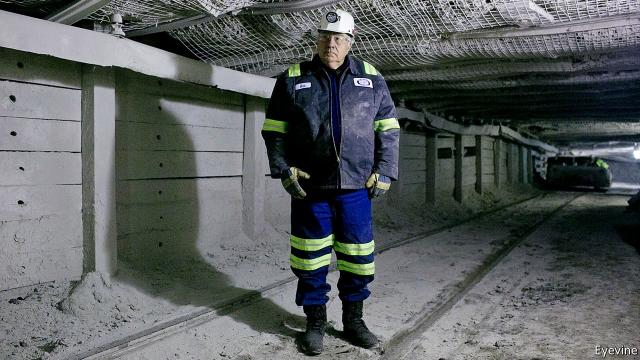Bob Murray, The Coal Baron With the President's Ear

January 19, 2018 - Tradition dictates that bad children get coal in their Christmas stockings. But the elaborate Christmas display in the headquarters of Murray Energy Corporation, America’s biggest privately owned coal firm, suggests otherwise. At its centre are two cherubic children pulling a wagon loaded with coal, and looking pleased with their haul. The other distinctive feature in the building’s lobby is a plethora of pictures featuring Bob Murray, the company’s founder and boss, with President Donald Trump. Murray was a vocal and generous backer of Trump; today he has the president’s ear. He sent the administration an “Action Plan” with 16 detailed policy requests, many of which the administration is on track to fulfil. Trump nominated Andrew Wheeler, a lobbyist for Murray Energy, to the number-two position at the Environmental Protection Agency (EPA). A few weeks after a meeting with Mr Murray, Rick Perry, the energy secretary, ordered a study that became the basis for his proposal to subsidise coal and nuclear plants.
Murray’s clout may stem in part from the hundreds of thousands of dollars he has given to Trump and his inaugurations committee. But he was pushing on an open door. Among the few consistent themes from this most inconsistent of presidents has been a fondness for coal and steel, where brawny men do essential work and are threatened not by shifting economics, but by greenies and weenies who want to shut them down. Trump and Murray both want environmental rules rolled back—Murray because it would be good for his bottom line, and Trump because a second consistent aim of his presidency is to reverse anything done by Barack Obama. It is doubtful whether policy shifts alone could revive coal mining, but the attempt to do so says much about how vested interests operate in this administration.
Trump played a hard-nosed businessman on TV, but Murray is the real thing. When he was nine, his father was injured in a mining accident and left paralyzed. Soon afterwards he began mowing neighbours’ lawns to support his family, and then went down the mines himself several years later. He broke his neck, twice. Gradually he worked his way up the ladder of the North American Coal Corporation, becoming the company’s boss in 1983. Forced out in 1987, Murray bought a mine in eastern Ohio, and then spent the next two decades snapping up others. Today Murray Energy owns 12 mines and manages another four, as well as transport terminals, barges, oil-and-gas wells and factories that make mining equipment.
These days coal barons are like newspaper barons: however rich and successful, they are shackled to a dying industry. Murray contends that the declining use of coal—today it generates 30% of America’s electricity, down from more than half in 2000—imperils energy security. Only coal and nuclear power, he argues, can provide a “reliable, resilient, secure electric power grid”. If coal falls below its current level of 30%, he warns, “the lights will go out and Grandma will freeze in the dark.”
Mike Jacobs, an energy analyst at the Union of Concerned Scientists, says that will happen “only if grid operators stop doing their jobs”. Rather than simply buying coal from companies like Murray Energy, as they did for decades, grid operators today have more choices. Natural gas—the most widely used fuel for electricity generation—and renewables have been snatching coal’s market share. Fracking has made American natural gas abundant and cheap. The cost of renewables, especially wind and solar, is also falling. These two trends have caused coal’s decline.
But Murray principally blames “the regulatory rampage of the Democrat party”, driven by the party’s professed belief in climate change—which, like Mr Trump, he considers “a hoax”. It has been perpetrated, he contends, by “developing countries of the world to get American dollars…[by] radical environmentalists…liberal elitists [and] Hollywood characters. I don’t refer to them as ‘people’.” Hillary Clinton talked about climate change not out of environmental concern, he says, but because wind-turbine- and solar-panel-makers gave “hundreds of millions [to] the Clinton campaign and Clinton Foundation.” All he wants, he says, is to “get the government out of picking winners and losers in the electric power grid”. Yet, by some amazing coincidence, his action plan—in addition to cutting the EPA staff by half, repealing the Clean Power Plan (an Obama-era scheme to reduce greenhouse-gas emissions from power plants), and ending other environmental rules—urged the administration to fund clean-coal technology and coalminers’ pensions.

Bob Murray

